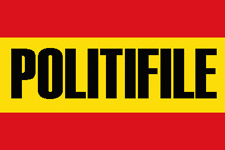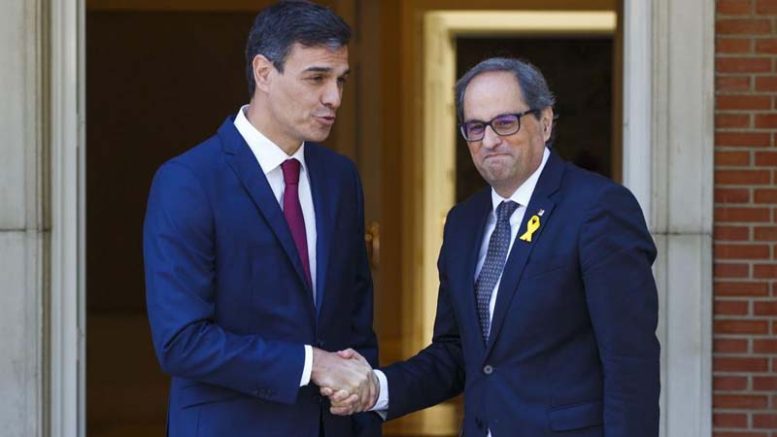Spanish President Pedro Sánchez and Catalan regional President Quim Torra held a two-and-a-half-hour meeting Monday at the Moncloa presidential residence in Madrid, where they discussed a range of issues relating to greater self-government for Spain’s conflictive northeastern region.
 It was the first time the two leaders had met and marked more than two years of stalemate in the normal pattern of dialogue between Catalan regional leaders and a Spanish president. Sánchez’s predecessor in office, Mariano Rajoy of the conservative Partido Popular (PP), had refused since 2015 to meet with Catalan leaders over their insistence on discussing what they say is their right to hold a referendum over independence from Spain, which is forbidden by Spain’s national Constitution.
It was the first time the two leaders had met and marked more than two years of stalemate in the normal pattern of dialogue between Catalan regional leaders and a Spanish president. Sánchez’s predecessor in office, Mariano Rajoy of the conservative Partido Popular (PP), had refused since 2015 to meet with Catalan leaders over their insistence on discussing what they say is their right to hold a referendum over independence from Spain, which is forbidden by Spain’s national Constitution.
In a post-meeting press conference, Torra said that the two were “in agreement that the Catalan question is a political problem that must be solved politically” and said he relayed his position to Sánchez that resolution of the situation must be based on the Catalan people’s ability to hold a legally binding independence referendum that he said is based on their right to self-determination.
Sánchez reportedly remained firm on the independence question, with Spanish Vice-President Carmen Calvo telling reporters in a separate press conference that “there is no possibility of the right of self-determination” because under international law that right “does not exist within democratic countries”, pertaining only to countries that are invaded or occupied by colonial powers. The government of Spain, she said, will “not accept a referendum” on Catalan independence because it is prohibited under the current Constitution.
 In the meeting, Sánchez did agree that the central government would drop Rajoy-era appeals to Spain’s Tribuna Constitucional (Constitutional Court) challenging several Catalan regional laws in the areas of social services, including one that guaranteed affordable energy prices to low-income Catalan households. He also agreed to discuss a greater degree of self-government for Catalonia, but always within the confines laid out by the Spanish Constitution and Catalonia’s own Estatut regional charter.
In the meeting, Sánchez did agree that the central government would drop Rajoy-era appeals to Spain’s Tribuna Constitucional (Constitutional Court) challenging several Catalan regional laws in the areas of social services, including one that guaranteed affordable energy prices to low-income Catalan households. He also agreed to discuss a greater degree of self-government for Catalonia, but always within the confines laid out by the Spanish Constitution and Catalonia’s own Estatut regional charter.
As a sign of a thaw in the relations between the regional and central governments, the two leaders agreed to move forward with regular working meetings of the bilateral commission overseeing relations between Catalonia and the central government that had been stalled since 2011, when former President Rajoy took office and relations between the two governments began to deteriorate.
► Read More in Spanish at La Vanguardia, El País and Público …
► Read More in English at El País, Reuters and AP/Miami Herald …
Check out more news from Spain about:
► Animal Welfare ► Corruption/Transparency ► Discrimination ► Education ► Environment & Sustainability ► Fair Trade & Development Aid ► Healthcare ► Historical Memory ► Housing & Homelessness ► Human Rights ► Labour & Unemployment ► LGBT ► Peace & War ► Politics ► Poverty ► Refugees & Migration ► Technology & Social Enterprise ► Women’s Rights

